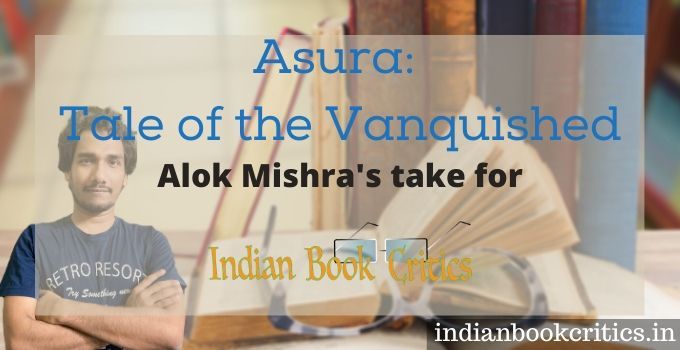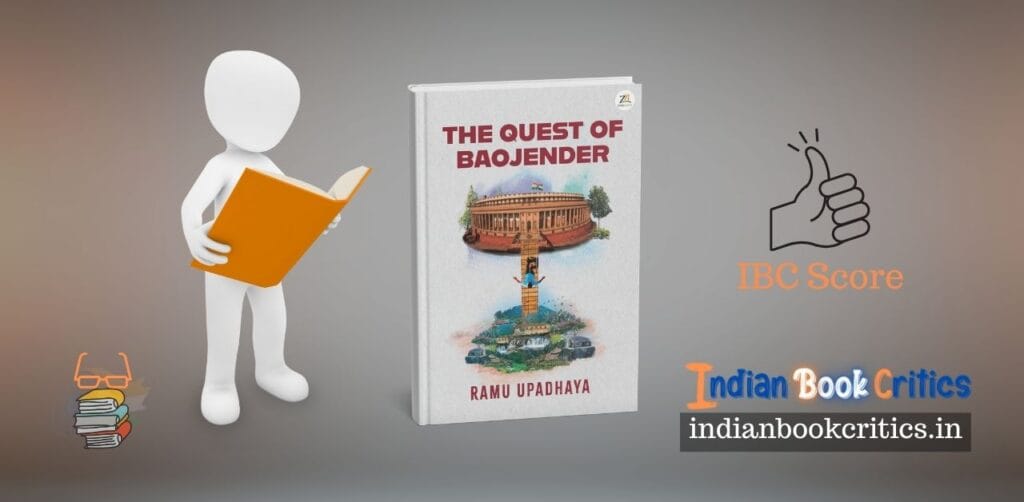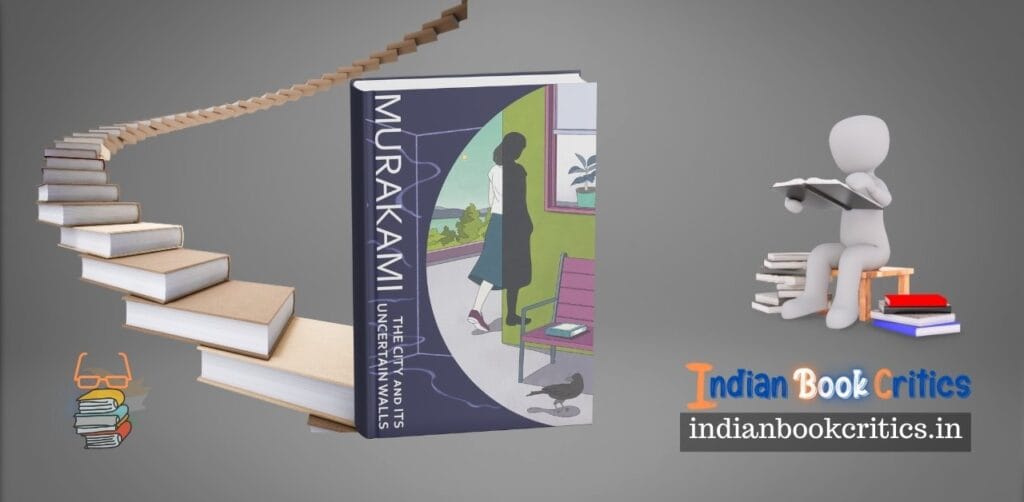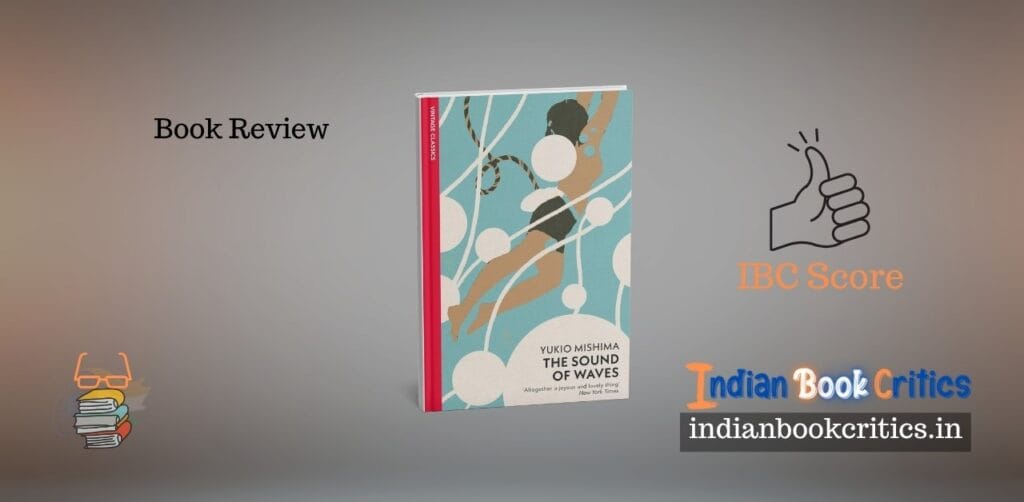Book Review: Asura: Tale of the Vanquished written by Anand Neelakantan. This review will be very unique and it will begin with an account of a conversation between Anand, the novelist, and his publishers.
Disclaimer:
The account of a conversation that is given below is a work of pure fiction. It does not have to do anything with reality. If the names or events resemble reality, that is purely coincidental. The writer of this fictitious conversation has used iconic names, dates, and events to aid story-telling. There is no intention to imply anything else.
A month in 2012, India.
Anand: Someone from Xyz publishing? Hey, I want to become famous as an author. Can you help me with that?
Xyz desk: Sure, Anand. Tell us if you can criticise something without any base or proofs or records? That’s the cheapest and easiest way to success in the Indian context.
Anand: Sure! And I do have a base. I would like to write about the oppression of women in I&^am. Women are considered nothing more than objects of reproduction and physical desire in that particular relig*&n. I want to expose that.
Xyz desk: Have you gone mad? How can you say that? Have you even read the holy book? You fool. You b^%tard? Haven’t you heard about the real oppressors of women? Ram and Brahmins?
Anand: Hey? Have you gone mad for real? What I said is true and what you are saying is a blatant lie.
Xyz desk: My dear Anand! India is a secular country and here you can only criticise one religion and anything related to that religion. Hindus and Hinduism are the best objects of ridicule. You do that and you become famous. Do we have a deal? And if you dare question any other religion, your book will be banned and you may be K!!!ed!
Anand: Oh my Gosh! Yea, yea! I accept the deal. I will tell in my book that Ram was an oppressor of the members of poor Rakshash clan who were peace-loving, dignified and self-dependent, most self-respecting people on the earth. Will that work?
Xyz: Oh my boy! You will be a bestselling author! All the best!

The review starts now. And this review, let me tell my readers, is a purely objective analysis of Anand Neelakantan‘s debut and bestselling work, Asura: Tale of the Vanquished. [divider]
Asura is written in a confusing first-person account which seems more like the author’s very own voice hiding behind the veils of being Ravan’s or Bhadra’s. Ravan’s narrative is purely anti-brahmin, for the reasons best known to the novelist, which is surprising as he was himself a very renowned Brahmin but as they say, everything is fair unless it’s a work of fiction and you can virtually do anything in the name of it. It is surprising that these cowardly authors, who work on ancient Hindu scriptures and history, use the garb of things being purely fictional, somewhere in the very beginning, but promote their works with taglines such as ‘based on Epic Ramayan, Mahabharat, Lord Ram’. Yes, if you are guessing, Amish Tripathi also falls in the same category. It’s ironic that they cannot carry the weight on themselves and hide behind the veils of fiction rather than owning it and proclaiming that they are trying to provide an alternate narrative. However, they leave such tasks to their PR machinery. Anyways, coming to the novel itself, written in a very semi-standard or even below that level language, the work sails to that side just with the suggestion that this is a work based on Ramayan, the Hindu epic.
At the end of Ravan, shown as a heroic warrior who stood against the ‘oppressors’ in the form of Ram and Devtas, who also fought alongside Ram because they were envious and sacred of Ravan, the novel begins. Ravan also suggests that Mandodary must commit suicide because he fears that Ram or Lakshman or Devatas may try to do something bad to her. I was not only baffled but also very intrigued by such assumptions by Ravan, which, in turn, were coming from Anand Neelakantan himself who was introduced to Ramayan by his parents. Once again, it’s a work of fiction, as the disclaimer just after the title page says.
“Instead of making themselves useful, the Brahmins prayed to the Gods they themselves invented for the rain, the sun, horses, cows and money and many other things.”
Ravan’s narrative seems inspired by the narratives of left ideologues and left-leaning historians who were ready to salvage Ravan’s demonly slaughter of Rishi-Munis and his savagery, being a cannibal, being a rapist and being a hijacker of the essential human rights. In this novel, an Asurayana as the novelist himself tells, Ravan has been given a place like the hero of the 80s movie, single-handedly eager and over-excited to subvert the bastions of crime lords. Here, however, it has been wrongly ascribed. Ravan’s incessant hate for Vedas, Brahmins, saints and sages may be justified to an extent but cannot be digested in the way which has been chosen by the novelist here. A reader who has read, understood or known about Ram and Ramayan will find this account of Ravan’s narrative not only perverted but also extrapolated beyond the limits of personal hatred for a cause or a certain idea. Ravan’s philosophy, in this novel, resembles, done very consciously and knowingly, the philosophy of the anti-Hinduism thinkers of the day:
“In fact, it served as a perfect tool to mint money and gain material favours. They were no fools-these Brahmins. They knew how to project even the mundane tasks of burning twigs as earth-shaking, scientific discoveries and claimed to tame the forces that controlled the world.”
Even works of fiction have ideas that are inspired by some drive or some cause. What is your cause, Mr Anand Neelakantan? How can you imagine that the saints of those days were doing things for material gains? Is it justified, even in the realm of fiction that uses ‘iconic names’ just to ‘aid to the fiction’? I am not only amused but also aghast as to how a particular community has been constantly assassinated by the cowards like this novelist very cleverly using the shield of fiction which seems coloured with the blood of innocents. He writes in his work that Brahmins used to do Yajna and other religious rituals to serve their monetary and materialistic gains. However, the author is answerable, how could someone be termed materialistic if he announced the renunciation from the material world before becoming a Sadhu, a Sanyasi or a Guru? Was Vashishtha or Agastya or Valmiki greedy? Were they doing Yajna and other rituals for their personal purse to be filled with money? This is illogical and does not support even a fictional cause and certainly does not aid the fiction as claimed by the novelist. However, it successfully offers fodder to those who want to grab opportunities to pass their violent slurs on Brahmins of the day who are not only poor but also dying. As the book has been touted as ‘a novel based on epic Ramayan’, it becomes a perfect piece for propaganda.
“Mahabali gave permission to Deva Brahmins to preach their religion in the Asura capital. Soon, this small centre grew into a massive missionary institution. It became the hot-bed of conspiracy and court intrigue. Finally, before the Asura elite could work out what had hit them, Deva Brahmins had overcome the last Asura empire.”
There are many such references in the novel that I can keep throwing here all day. These extremely carefully decorating ideas, which aid the fiction by this novelist, are nothing but his personal opinions, which must be inspired by reading some erroneously perverted version of Indian history. Well, in the realm of fiction, Vamana Avtara may have happened in such times when there were no religions but just a Sanatan philosophy, to propagate religion according to this novelist. Which channel of illogical argument making Anand watches would be extremely amusing for me to spend these nights of lockdown and corona-atmosphere? I agree that fiction can easily subdue truth and fact. However, can fiction also enjoy the liberty of suspending logic with illogical and irrational ideas? Well, if it happens, that seems to have happened in Asura: Tale of the Vanquished, then it becomes FARCE or COMEDY or PURE PROPAGANDA. Readers will decide it.
“I was only forty-six, but in a society where girls were married at six, I was ancient. ”
I really haven’t come across anything like this. I don’t remember reading anything that mentions a girl could be married just after being 6 years of age. If I have heard something like this, it only happened in the case of a certain proph3t of a certain religion. Was that the inspiration for Anand’s hallucination? He will better answer this.
“Though the people of Ayodhya wanted Rama to be their king, he ignored the wishes of the masses to satisfy his henpecked father. I hated Rama for his false ego and eagerness to prove his self-righteousness to the world.”
Well, in a strange world, this also passes off silently as an aid to the fiction. I don’t think Ravan could ever understand this. However, I do find myself very sure that this novelist can never understand the mathematics behind a son’s sacrifice for his father’s ‘words’. Ram’s ‘false ego’, as claims Anand Neelakantan sitting in the guise of Ravan in this novel, was a trillion times better than the ego of Ravan (or the author himself) who tried to champion the cause of evil and become a self-satisfied hero of Adharm in the name of absurd logic that defies and defiles all the basic tenets of logic itself.
“The Ravanas of the world are dangerous to those who wish to use the scriptures for their own purposes and lord over others, exploiting everyone. The Ramas of the world are used by such oppressors, as models to justify their way of life.”
As you move towards the conclusion of this novel, you keep encountering such propaganda-driven lines often, every now and then. A world where Ravan was a hero and Ram was an oppressor does exist for thinkers like Anand and others. Though it is their ‘birthright’ to glorify Ravan or anyone they want as they are, luckily, born in India, a democracy. However, they don’t leave any stone unturned in ‘abusing’ the very Indians’ faith, their ideals and their heroes from history. Even with this, we don’t have any problem only because we are peace-loving and rational people who understand that ‘fiction’ can go beyond ifs and buts, thoughts and imagination. However, as a novel, Asura by Anand Neelakantan has more than a million flaws as well. He may have succeeded as a propagandist but he has failed to impress as a novelist.
Here are some of the flaws in the novel that you will realise if you read critically, objectively and carefully:
- The narrative is shaking. It’s not very clear what objective the novelist wants to achieve. And therefore, there is a lack of uniformity in the work. It merely keeps extending faux pas.
- In the Indian context, the novel will have so many problems for the readers. It will have to have the readers’ minds brainwashed in order to digest this plot, the theme and the storyline.
- Rather than speaking for himself, Ravan, the central character, begins being a shameless mouthpiece of the novelist himself and this alienates the very central character from the storyline and it becomes too obvious, boring to the zenith and rather annoying for the readers as the novel progresses.
- Selective forgery by the novelist in the historical and religious facts has made the storyline very confusing. The readers will be angry on more than many occasions when they find the selective selection of facts to suit the need of the hour rather than the novelist being constant with his choice of criticism and appreciation.
- The novel seriously is deprived of a standard language. Critical readers and also serious readers of Indian fiction will find this novel rather amusing than being a standard work of composed and standard fiction. Moreover, the work is too long to be enjoyable and becomes repetitive with time.
So, here was my review of this novel, orphan in terms of any base or proposition, Asura. I strongly oppose reading this work because it may make you angry rather than relaxed or comfortable. Better avoid this and pick any other work if you want to read a novel or you can actually read the original Ramayan to understand the character Ravan. Yes, if you are daring enough to read things beyond your imagination or rather different or very complicated, you may have your luck tested with this book.
PS:
“I would rather die an honourable death by continuously reading all the novels by Durjoy Datta than reading this novel and dying confused.”
An anonymous reader of Indian fiction
UPDATE: An anonymous coward with [email protected] came to the comment section to teach me about ‘subaltern studies’. The coward hiding behind XYZ, frightened or ashamed enough of his or her existence to offer a name, doesn’t know that I have not only studied but also taught the hyped theory. Hello, Mr or Ms coward, next time you comment, please show the guts to name yourself. Otherwise, you will be a lame follower of the author whom you came to defend. So much afraid of a review?
IP Address of the coward: 2401:4900:38c8:4c3c:a4ea:867c:42bb:2af
Came from New Delhi or Imphal.
Show some courage, XYZ. Own your argument.
Review by Alok Mishra for Indian Book Critics
Alok Mishra is one of the best contemporary book critics in India. He is among the top book bloggers in India and also a well-received literary opinion maker.
Asura: Tale of the Vanquished - Book Review
- Indian Book Critic's Critical Rating
Summary
Asura: Tale of the Vanquished by Anand Neelakantan is a novel best avoided. It retells the epic Ramayan in a very different and somewhat confusing way. No doubt Ravan was a person of repute but not as much as this novelist has told. This work extrapolates many events and adds a nonsensical narrative to those. Disaster in the name of fiction!




7 Comments. Leave new
This is an amazing book review that exposes, brilliantly, the hyper imagination of these authors who are too eager to find loopholes and imaginary theories in the works of the greatest quality like Ramayana and Mahabharata including other Hindu tales. Amazing work, Alok! You have used their arguments and course of action against them… sharing the review right away!
Wow! This was intense… I seldom read such bold and to the point review of this book Asura by Anand Neelakantan! Thanks for saying out loud what many fear or shy away from saying.
very thoughtful review. in ancient days, Critics used to call such gimmicks bestseller formula. seems it has continued. authors like Anand Neelakantan are using the same.
Even I wants to say many of these things about Asura by Anand Neelakantan. Thanks for the vook review sir.
I enjoyed reading this review… I have heard about this novel long ago but could not read it because of many reasons. However, I did have an inclination about how this novel could be. this is the usual antagonist’s perspective where it’s not due… your review humorous and sharp and you have highlighted quite strong negatives in this novel by Neelakantan. I will have to read it to assure myself and I may write a review too. Thanks…
This one is a pretty nice review. You have highlighted all the points in a proper sequence that provided us with a clear concept to avoid book like this.
Though the review seems to be cynically written, it is the best that could suit a novel like this. I liked the idea of putting a fictional conversation on the top… humorous but also very near to a bitter reality which summarises very well what’s happening in India right now. Asura is a novel that I read 3 years ago but totally disliked it. May reviewers have also reviewed the book on Goodreads and Amazon with same disgust. However, Indian book critics has done just wonderful! You have voiced for many readers about the book by Anand Neelakantan. Thank you guys so much!